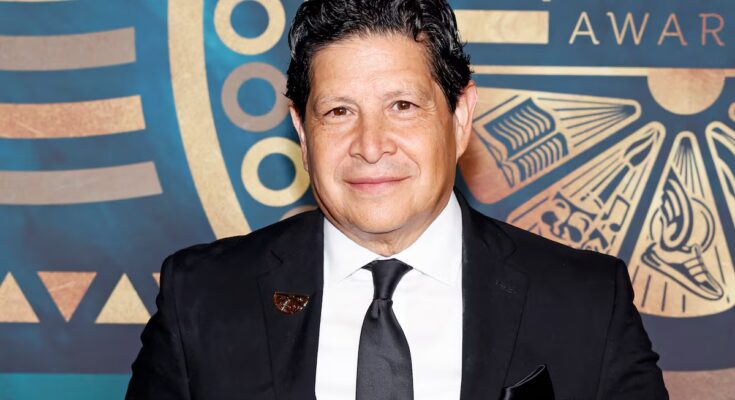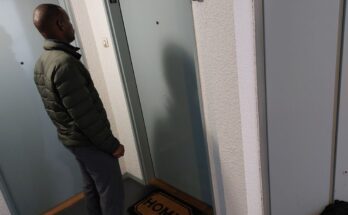José Antonio Tijerino (Managua, Nicaragua, 61 years old), president and CEO of the Hispanic Heritage Foundation (HHF), his face lights up when he says the name of baseball player Roberto Clemente. It’s not a coincidence. For him the Puerto Rican – also a migrant to the United States and one of the most admired athletes in history – is a moral reference. He died in 1972 while trying to bring humanitarian aid to Nicaraguans affected by the Managua earthquake. “That gesture made him my hero forever,” Tijerino says. He is in his office in Washington D.C., surrounded by photographs of young Latinos who have followed the programs he has directed for more than a decade.
A few days ago he received the Eagle Leadership Award, one of the most prestigious awards given to Latino leaders in the United States. “It is an honor that came in a moment of personal reflection,” he says in an interview with EL PAÍS. “I don’t see it as a reward for what I’ve done, but as a call for what remains to be done.” The Nicaraguan insists that the work of the Latino community is important. For him the prize works like a compass. “When leading an organization like HHF, the risk is to become accustomed to inertia. This award reminded me that our work (empowering young Latinos) is not optional. It is urgent.”
Tijerino insists that the recognition is not his alone. “It’s a reflection of everything,” he explains. “I went up on stage just to receive it, but it’s recognition of my colleagues, of the work of the communities we serve. They wouldn’t give me an award if we weren’t effective,” he says before pausing. “Our community knows we believe it.” HHF was founded by the White House in 1988 as a nonprofit organization focused on education, workforce development, social impact and leadership, with culture as the cornerstone of its mission.
Tijerino’s recognition inevitably led him to reflect on his own history. “I came to the United States when I was seven and didn’t speak a single word of English. This contrast has guided my entire career.” A few months ago, during the Hispanic Heritage Awards, he held up a sign that said, in English: “I am an immigrant.” He explains that the message was intentional: “Saying ‘here we are’ is a powerful message.” And he adds: “With everything that is happening now, I wanted people to understand that we also need to find balance and take a stand. Our currency today is hope.”
He says he knows well the feeling of feeling “neither here nor there”. “I belong to the whole world. We all belong to the whole world. That includes all people, all migrants, all refugees.” For him, that public message was not just a personal statement, but an ethical position. “Racism, homophobia, sexism, discrimination against people with disabilities, Islamophobia, anti-Semitism… none of this can be tolerated in our community.” He argues that activism doesn’t start with big marches, but “at our kitchen tables.”
When asked about the immigration debate in the United States, he takes a long pause before answering. “The most worrying thing is that we talk about migration without humanity. We talk about numbers, walls, crises… but not about people.” He assures us that a wrong vision persists: “Being a migrant is still confused with being someone else’s. But migrants build this country every day.” In the face of Donald Trump’s administration, he emphasizes the importance of the resistance of the Hispanic community: “This is a critical moment for Latino leadership. And that leadership must come from young people.”
The idea that young people are “the leaders of tomorrow” seems, in his words, “a passive-aggressive message, like telling them ‘let go, it’s not your time yet.'” Their argument is simple: “A 14-year-old with a laptop or a phone with Wi-Fi can reach more people in a second than Gandhi, César Chávez or Martin Luther King could in their entire lives. We didn’t have that power. They do.” And he concludes: “Our relevance as senior leaders is not in ourselves, but in them.”
We also talk about demographics. “The average age of Latinos is 30. The average age of the rest of the United States is 40. The average age in the United States is around 54, but among Latinos, it’s a young 14-year-old. That young person can change the world from their cell phone. And we need to encourage them to do so.”
He champions values, authenticity and what many would call a flaw: naivety. “Being naive makes you feel things that others would not,” he says, laughing. “It pushes you to take risks. To believe something is possible when others believe it isn’t.” He lists his essential rules for a young Latin American: boldness, humility, tenacity and impatience. “I don’t want to be patient when a child is separated from their parents. I don’t want to be patient when someone’s rights are trampled upon. Patience is not a virtue in these cases. Action is.” And he returns to everyday life: “If you collect rubbish in a park, if you smile at someone who needs it, if you see that someone’s rights are being violated and you register them to report it, you are protecting your community.”
Changing the narrative is important
Tijerino’s speech on young people is based on the programs that the HHF has built over the years. The organization has just won the BRAVO Award for his podcast Fritangaa space where Latino figures speak honestly about identity, challenges, contradictions, and community. The name, he confesses, moved him. “When I proposed that it be called Fritangasome said, “Who knows what a fritanga is?” For me it’s the opposite: it’s a symbol. In Nicaragua or Miami, a fritanga is where you eat something quick, simple, and homemade. Where community is built. “It’s not fancy, but it’s real.”
The foundation’s expansion has also extended to the digital world. “We’ve taught 100,000 kids to code across the country,” he says. Moreover, they have developed Latin explorersthe first Latin themed video game inside Minecraft. “It has been played by 30 million children in 30 languages. The HHF team does an incredible job helping young people and parents navigate their journey from financial literacy to mental health.” The list of priorities also includes support for small businesses, training for journalists and Speeches with those who listen directly to the community. For Tijerino, it’s all part of the same thing: building structures that support Latino leadership.
Then he returns to the numbers, but not to celebrate the statistics, but to warn about the scope of the moment. “Seventy-eight percent of new jobs over the next five years will be filled by Latinos. There’s no way this country can function without us.” He believes that the value of community should not be limited to purchasing power. “We talk about the four trillion dollars of consumption, our demographics… All of that matters. But it only works if we use that power to help the most vulnerable.”



